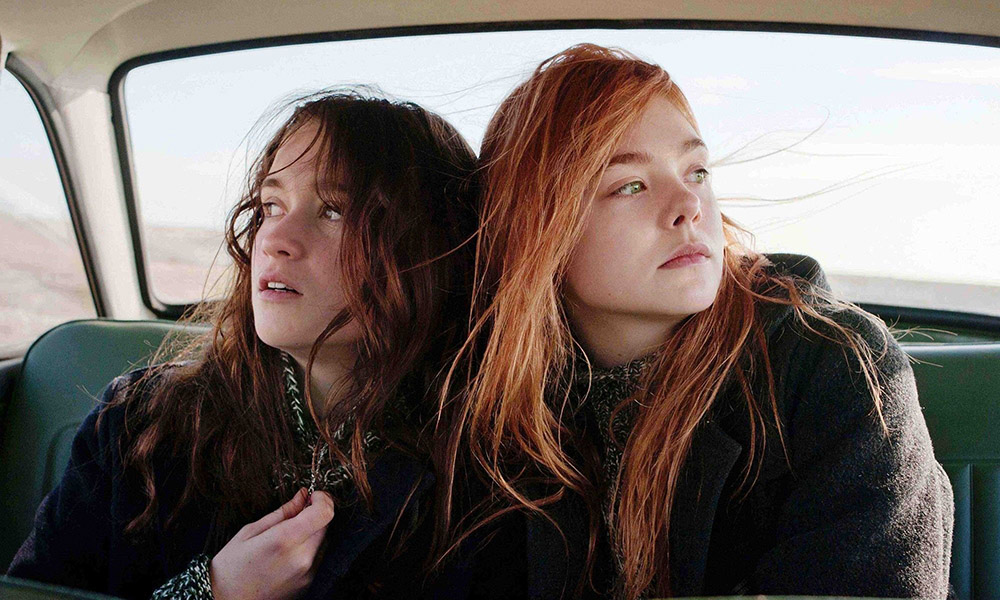There’s something about 1960s London that smells like teen spirit. Caught in between the heyday of the Beatles and the stifling atmosphere of ‘50s conservatism, the title protagonists of the sharply intelligent Ginger & Rosa relish the tide of change that is just beginning to roll in at the start of the decade. Best friends since birth, they are restless 17-year-olds that sniff at their mothers’ bourgeois domesticity and yearn for freedom. Theirs is a familiar narrative, filled with the same rebelliousness and shattered illusions of adolescence, yet it’s a coming-of-age tale that explores an emotional landscape far broader than that of mere tension between generations.
The threat of nuclear conflict generating the sense of anxiety that pervades the film becomes a rather literal marker of a new era; the opening image of the mushroom cloud over Hiroshima serves as foreshadowing of the bomb’s coming role in the Cold War, as well as a potent symbol of instability. The established institutions and old way of life are resting on fragile ground, the potential for their destruction the impetus for change.
When we first meet Ginger and Rosa, however, they are carefree teenagers blissfully unaware of this growing tension. Almost wordless shots of them hitchhiking to the shore, kissing boys in alleyways, or sneaking cigarettes are the visual highlights of the film and perfect vignettes of innocent teen rebellion. The buildup to the loss of that innocence seems to be the central interest for director Sally Potter, whose Oscar-nominated Orlando, released in 1992, followed the transition of a character from man to woman.
That journey is contained in the evolving friendship between Ginger and Rosa, whose differences in personality make them two sides of the same coin. The flame-haired Ginger (Elle Fanning) is a sensitive poet and budding activist that dutifully attends Ban the Bomb meetings, while the fatherless Rosa (Alice Englert) channels her own rebellious tendencies into ignoring schoolwork and chasing boys.
Both girls gravitate to the magnetic presence of Ginger’s glamorous father, Roland (Alessandro Nivola). An intellectual bohemian who was once imprisoned for refusing to submit to the draft, he becomes the lightning rod for the inevitable conflict in their friendship. The film devolves into the soap-operatic at this point, forcing the storyline to come to a head that could have been achieved with less artificial means, but this failing is minor in the context of the film’s expansive scope.
The two actresses emerge as genuine talents, Fanning a veritable force of nature whose astounding emotional range beautifully complements the film’s impressionistic feel. It’s the negative space between the dialogue and the moments of ambiguity between the melodrama that makes Ginger & Rosa feel like a microcosm of intangible melancholy.







Crowdfunding and the Cold War
Only a few decades ago, a blink of an eye in a historical sense, the United States was in the middle of the Cold War. Tempers flared, weapons caches filled up, and the media had a blast describing what the “day after” would look like after the two major superpowers annihilated each other.
Come 1991, and one of the superpowers could not bear the weight of its world-dominating ambitions. It folded and left behind chunks of the Berlin Wall and a disintegrated Warsaw Pact. “Spy schools” all over the United States let their Russian-language instructors go in the hopes of finding a different enemy. Not that we didn’t succeed, but that’s a different story.
Fast forward to 2013, to a new generation of creative minds who’d rather do battle with each other in a video games arena. Computer code became their religious texts and Google Multiplex their temple. Demigods such as Larry Page, Sergey Brin, Mark Zuckerberg, Jack Dorsey, and Steve Jobs presided over a Silicon Olympus, making our world a much smaller place connected by WiFi, optic cables, and satellites. Google Moscow may not differ much from Google Chicago, which would have been the biggest fear of the Cold War mongers.
Maybe we’ve evolved a bit. Maybe we’ve become a bit smarter. Maybe—and this is a huge maybe—we have a chance to survive if we embrace the fact we are members of the same species who share the same DNA.
I have always been a dreamer, an idealist, but what makes me so optimistic? A few days ago, someone from Siberia created a project on our community-oriented crowdfunding website, FunderHut, for an animal shelter. Think about it—an animal shelter in the former Soviet Union funded by a crowdfunding platform without borders or boundaries. This would have been unimaginable a few decades ago. Not only did the technology not exist, but the idea of funding a shelter on “enemy” territory would never have been tolerated by either side.
Crowdfunding is the hope for the future, our future. If we contribute to the projects in other parts of the world, we will have a vested interest in seeing that part of the world become a better place.
Crowdfunding, which grew from an obscure business four years ago, has become a major force in various industries. But more importantly, crowdfunding is one of one of the most optimistic and idealistic tool ever invented.
Though crowdfunding is a concept not understood or barely understood by 85 percent of the public, is a way of financing projects that would not happen otherwise and a way of thinking for generations to come.
Remember, Moses had to wander the desert for forty years, until all the former slaves died and a new generation had emerged. In our world now, it just may take a new generation that doesn’t remember why we had those idiotic wars, a group of active, committed people who’d rather work for the good of the planet than its annihilation.
And you have to admit a dog shelter in Siberia is a prime example.
Eugene Salganik, Co-Founder
FunderHut (www.funderhut.com)